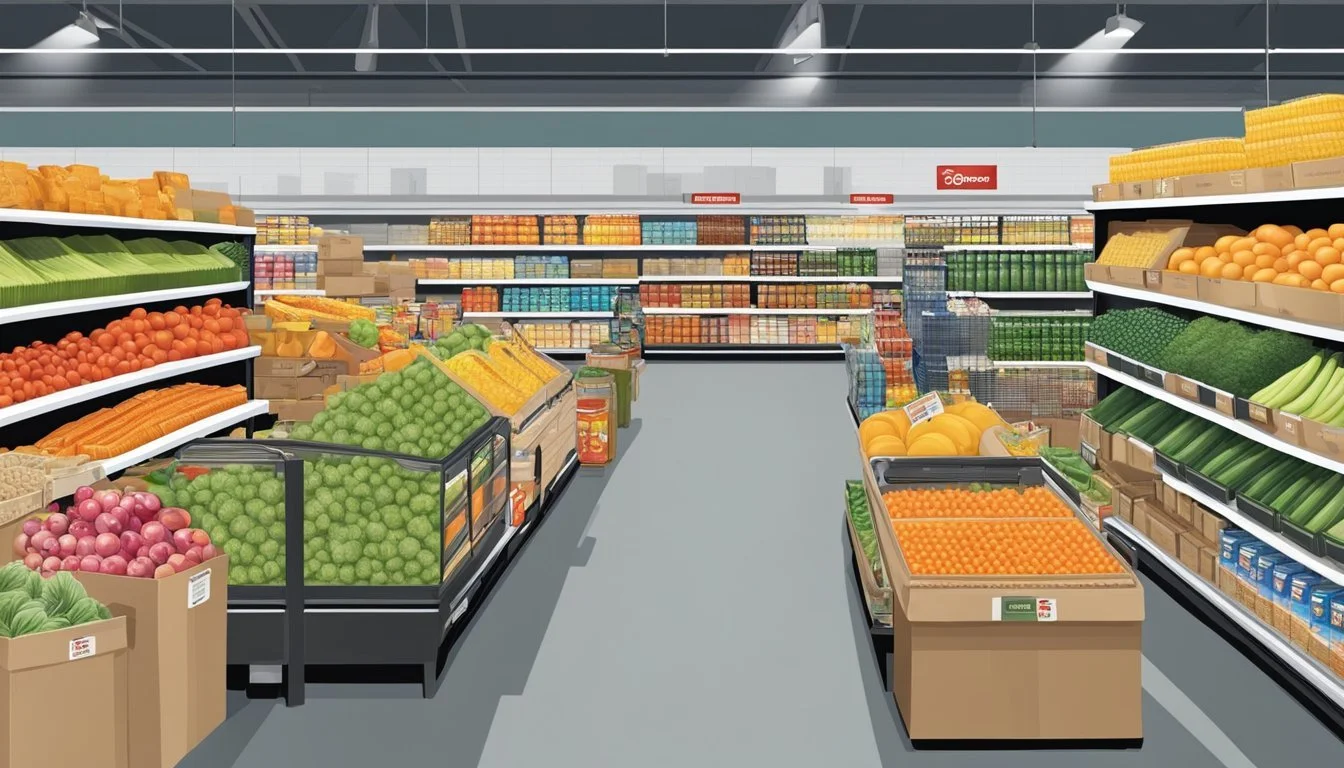Costco vs Safeway
Comparing Selection, Prices, and Shopping Experience
When shopping for groceries, consumers often weigh their options on where to get the best value for their money. Among the myriad of choices, Costco and Safeway stand out as two major players. Costco, renowned for its bulk purchases and membership model, is generally perceived to offer lower prices on goods as compared to other retailers. On the other hand, Safeway, with its free loyalty program, caters to customers looking for a traditional grocery experience and the opportunity to save through exclusive deals.
Costco's business model is built on a subscription-based membership, which encourages shoppers to buy larger quantities at discounted rates. Customers are enticed by Costco's added benefits, such as the 2% cashback offered by its Executive Membership, providing a compelling reason for shoppers who frequent the store. In contrast, Safeway's loyalty program does not require an upfront fee and boasts a reward system that can yield savings on future purchases.
Each store has its unique appeal and ideal customer — Costco benefits shoppers with adequate storage space looking for bulk deals, whereas Safeway is more suitable for customers who prefer to buy groceries in smaller quantities and enjoy immediate discounts without the need for a paid membership. As these two retail giants continue to compete, the choice between Costco and Safeway will largely depend on individual shopping needs and preferences.
Company Histories and Business Models
Exploring the historical evolution and unique business models of Costco and Safeway unveils key insights into their respective positions within the grocery store sector.
History of Costco
Costco, founded in 1983 by James Sinegal and Jeffrey Brotman, has grown to become one of the largest warehouse club chains in the world. It started with a single warehouse in Seattle and has expanded rapidly. As of 2022, it operates hundreds of locations worldwide, catering to members who pay an annual fee for access to bulk goods at discounted rates.
History of Safeway
Safeway's origins trace back to 1915, with M.B. Skaggs purchasing a small grocery store in Idaho, which emphasized value and customer service. This philosophy powered its growth into a widespread supermarket chain. Safeway has undergone various mergers and ownership changes over the decades but remains a familiar name in the grocery industry.
Business Model Comparison
Costco:
Membership-based revenue: Annual fees form a significant part of its income.
Bulk sales: Focuses on selling products in larger quantities at lower prices.
Limited SKU count: Offers fewer stock-keeping units (SKUs) compared to traditional supermarkets.
High sales volume, low margin: Relies on high volume sales with low profit margins.
Safeway:
No membership required: Open to the general public without membership fees.
Traditional supermarket model: Offers a wide range of products, including specialty items and a large SKU count.
Loyalty program: Provides a free loyalty program to incentivize repeat customers.
Profits: Has seen varying profit margins, with a notable increase over a ten-year span through the development of its own labels and infrastructure investment.
Product Range and Quality
When comparing Costco and Safeway, a primary consideration for consumers is the diversity and caliber of products available. Each store presents a unique shopping experience, with varying strengths in produce, meats, bakery, and specialty items.
Produce Selection
Both Costco and Safeway offer a variety of fresh produce. Costco provides large quantities typically in bulk, whereas Safeway offers a more traditional grocery store layout with wider selection of individual fruits and vegetables. Customers at Safeway can enjoy a broader assortment of fresh fruit and vegetables, allowing for more tailored shopping.
Meat and Dairy
For meat and dairy, Safeway provides a range of options including various cuts of meat and brands of milk and other dairy products. Costco is noted for its high-quality meat, particularly items like chicken breast and beef, which often come in larger packs. Their dairy section also offers large-sized options, ideal for families or gatherings.
Bakery and Prepared Foods
Safeway boasts in-store bakeries offering fresh bread and baked goods on a daily basis. In contrast, Costco's bakery section includes a selection of large cakes, pies, and bulk-packaged baked items. Both stores carry a range of prepared foods; Costco's options are great for feeding a crowd, while Safeway provides a more diverse selection appropriate for single meals or smaller households.
Organic and Specialty Items
Shoppers seeking organic produce and specialty items will find suitable options at both stores. Safeway often showcases a larger variety of organic produce and specialty health items, while Costco is increasing its organic and specialty ranges, frequently at more competitive prices.
Store Brands
Costco is renowned for its Kirkland Signature brand, offering a wide range of high-quality, value-packed goods across various categories. Safeway’s store brand products also provide quality at an economical price point, with some items comparable to national brands in taste and quality.
Price Comparison and Affordability
When exploring the cost-effectiveness of Costco and Safeway, it becomes clear that both stores offer different advantages related to pricing and savings, which can greatly affect a consumer's shopping experience and budget.
Overall Pricing Strategies
Costco operates on a membership-based model where customers pay an annual fee to access wholesale prices. Bulk purchasing is central to their approach, providing significant price reductions on large-quantity items. Safeway, in contrast, does not require membership and offers competitive pricing on individual items. Kirkland Signature, Costco's in-house brand, often undercuts competitors on price while maintaining quality.
Bulk Buying Savings
At Costco, bulk buying can translate to notable savings for the customer. Products sold in larger quantities typically have a lower price per unit, effectively making them cheaper than their counterparts at traditional retailers. This is especially true for non-perishable goods and household staples. Safeway, while offering some bulk deals, primarily focuses on standard retail sizes.
Membership and Rewards
Membership and rewards programs are integral to both Costco and Safeway's offerings. Costco has an Executive Membership that provides 2% cash back on purchases, though it comes with an annual fee. In contrast, Safeway offers a free loyalty program which can save customers 1.4% to 1.67% on their grocery bills through points and rewards.
Comparison with Other Retailers
When comparing Costco and Safeway to other stores, Costco's prices are generally lower, making it a strong competitor against Walmart Supercenter, Target, and Sam's Club. Safeway's prices are closer to those of regional stores such as Albertsons and Publix. In the broader market, both Costco and Safeway often offer better value than specialized stores like Whole Foods Market and, depending on the item, can even be competitive with discount chains such as Aldi and WinCo.
Walmart: often hailed for overall value.
Whole Foods and Sprouts Farmers Market: typically pricier, focusing on organic products.
Retailers like Trader Joe's and Aldi: offer unique budget-friendly options.
Demonstrating knowledge of pricing strategies and savings options at Costco and Safeway shows that both retailers cater to different shopping preferences and can offer value, depending on customers' shopping habits and needs.
Shopping Experience
When comparing Costco and Safeway, it's important to examine the nuances of the shopping experience that affect consumers, from store layout to customer service and return policies.
Store Layout and Navigation
Costco operates on a membership warehouse model, which means its stores typically feature vast, open layouts with bulk items stored on high shelves. Customers may find a limited variety of brands compared to traditional supermarkets, with a focus on the Kirkland Signature store brand. Safeway stores often provide a more familiar grocery store layout, with more branded product options and a standard supermarket navigation experience.
Customer Service and Satisfaction
Safeway has a strong emphasis on customer service, with many stores offering a personalized experience due to their smaller size and more traditional supermarket model. They conduct customer satisfaction surveys and typically have staff readily available for assistance. On the other hand, Costco also rates highly in customer satisfaction according to industry surveys, often due to their competitive pricing and quality of store brands.
Return Policies and Guarantees
Costco is renowned for its generous return policy, allowing customers to return items at any time for virtually any reason. Their satisfaction guarantee extends to their store brands and memberships, ensuring a high level of customer confidence. Safeway's return policy is also customer-focused, accepting returns of products their customers are not satisfied with, but it may include more stipulations compared to Costco's broad guarantee.
Community Impact and Sustainability
Assessing Costco's and Safeway's social and environmental contributions reveals significant strides in sustainable operations and community rapport. Both retailers implement progressive employment practices, foster environmental initiatives, and actively engage with local communities.
Employment Practices
Costco is known for its competitive wage structure and benefits, fostering a stable workforce with opportunities for advancement. Safeway, under its parent company Albertsons, is recognized for providing a diverse range of employment opportunities and inclusive hiring policies.
Environmental Initiatives
In terms of environmental stewardship, Costco has implemented measures like energy-efficient building designs and promotes a range of sustainable and cage-free products. Safeway has made a commitment to sustainability by sourcing a selection of signature products that adhere to responsible environmental standards. Both stores offer a variety of grocery options with an emphasis on reducing their carbon footprint.
Community Engagement
Costco and Safeway play pivotal roles in community development through a variety of programs and partnerships. They support local organizations and national charities, reinvesting in the communities they serve. Costco is particularly noted for its scholarship programs and Safeway for its efforts in hunger relief.
Consumer Perceptions and Brand Loyalty
Consumer perceptions and brand loyalty are critical factors that influence a shopper's choice between Costco and Safeway. These factors are often shaped by customer interactions, overall satisfaction, and the trustworthiness of the brand.
Consumer Ratings and Reviews
When it comes to consumer ratings, Costco and Safeway have developed notable standings in the market. Costco, known for its bulk offerings, has consistently garnered positive reviews from families and individuals looking to buy in larger quantities, often improving their market basket. The Safeway experience, with its loyalty program, appeals to consumers seeking personalized savings and a diverse selection of signature items, without the need for a membership.
Costco's Executive Membership program, which offers a 2% reward on purchases, creates an incentive for consumer loyalty. In contrast, Safeway's free loyalty program doesn't require upfront costs, providing between 1.4% to 1.67% back on groceries, which can be a lucky find for cost-conscious shoppers.
Brand Recognition and Trust
Costco has achieved high brand recognition and trust, particularly for its Kirkland Signature products, which are seen as comparable in quality to national brands. The store's reputation is bolstered by high rankings in customer trust and loyalty, suggesting a strong emotional connection with its consumers.
On the other hand, Safeway is also a trusted brand in the household grocery market, offering quality store brands and personalized shopping experiences. While Safeway may not feature the same level of reward incentives as Costco, its accessibility and community presence continue to maintain shopper trust.
Each brand leverages its strengths to build loyalty: Costco through its economic bulk purchasing and rewards, and Safeway through its customer-focused programs and convenience.






